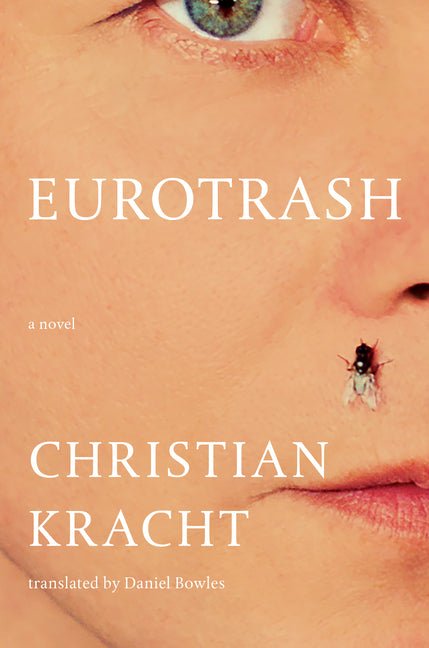Liveright Publishing Corporation
Eurotrash
Couldn't load pickup availability
LONGLISTED FOR THE INTERNATIONAL BOOKER PRIZE 2025
A probing masterpiece-in-miniature of self-reflection and cultural reckoning.
The Times [UK] • 12 Best Books of 2024
Financial Times • Best Books of 2024 [Fiction in Translation]
A Vanity Fair "Can't Miss Novel to Read"
Literary Hub • Best Book Covers of October 2024
From "the great German-language writer of his generation" (Joshua Cohen) comes the second novel of Christian Kracht's career narrated by an eponymous "Christian" (the first was his bestselling debut, Faserland). Eurotrash begins in Zurich, where Christian has returned to care for his eighty-year-old mother after her discharge from a psychiatric institution. Confronting the dark shadows of his family's past--particularly his grandfather's strong ties with the Nazi regime--and struggling to navigate the emotionally wrenching terrain of his relationship with his mother, he sets off on a road trip with her. As they traverse Switzerland together in a hired cab, mother and son attempt to give away her vast fortune, stuffed in a large plastic bag, to random strangers.
By turns disturbing, disorienting, hilarious, and poignant, and brilliantly rendered in English by prize-winning translator Daniel Bowles, Eurotrash tells an intensely personal and unsparingly critical story of contemporary culture; a story that shows us a writer at the pinnacle of his powers of insight and observation.
Share
Book Details
ISBN:
9781324094562
EAN:
9781324094562
Binding:
Hardcover
Pages:
192
Authors:
Christian Kracht
Publisher:
Liveright Publishing Corporation
Published Date: 2024-22-10
View full details
This is a two and a half. I was expecting this to be much better as it had great reviews and was shortlisted for the International Booker. The subject has potential but overall I found this pretty dull. It was not funny (despite being billed as blackly comic). Inexplicable that this was such a critic’s favourite. I would have abandoned it but it was quite short so I pressed on.
Books are subjective and although I finished the read I can’t say it was for me.
Witty, and catty, but either the author has worked incredibly hard to hide all the hard work that went into crafting this, or the novel is just exactly what he thinks, written exactly how he would say it (even in translation), more or less off the cuff, and he could have gone on like this forever. Which I would have liked, to be honest. Perhaps that is the problem with sending up rich and clever and entitled people? They are just fun to be with? In fact, I wish he and his mother could travel the world and deliver their acerbic judgements on everyone they met and I'd buy every one of their books.
A clever joyride with meaning. Loved the rewriting and narrator. Didn’t want the story to end.
One of my abiding memories of Switzland is going up Mount Pilatus and finding, at the summit, two contrasting events. A convention of the “Club des Chefs des Chefs” (the Chefs for international Heads of State) - and an Alphorn Fest. This typifies the world of “Eurotrash.”In the novel, the author/narrator - a rather affected man in his 50s - take a trip in a taxi through “the despair of an autumnal Switzerland”. This Switzland is a world of moneygrubbing and exit clinics, not Heidi - or even the 60s glamour of St Moritz and Gstaad. The mother is fuelled by a cocktail of barbituates, vodka and cheap Swiss fendant wine. Her designer outfits conceal a colostomy bag.So, where do they go to, these unlovelies? It’s not just a trip through Old Europe (“Gstaad, Kampen on Sylt, Cap Ferrat, Mayfair, the Esperanto of euro-trash”) but also through family memory. The author/narrator (it is deliberately difficult to ascertain where one ends and the other starts) has an acute self-awareness: born on the right side of the tracks, but the wrong side of history.In their blackly-comic caper, the pair spend much of their time trying to atone for the sins of the fathers by throwing away their ill-gotten gains - but thousands of Swiss Francs prove more difficult to chuck away than you’d imagine.This novel doesn’t just scratch but gleefully gouges away the surface of glitzy high society - and what’s underneath isn’t pretty. The characters are unwholesome and as unfashionable as a cocktail Sobranie, yet they are relatable. At the heart of the story is a mother and son trying to make amends for their lack of communication. They can’t bear each other, yet they can’t bear to be without each other: “...for I saw my mother in a Pucci bikini at the pool in St. Jean-Cap-Ferrat whenever I closed my eyes, and not here on the gurney with that obscene tube jutting from the incision.”Darkly humorous and brutally honest, this novel is a good anecdote to all those twee “uplifting feelgood” novels. It’s probably not for everyone, and I expect I missed a lot of the cultural references, but it hit plenty of nerves for me.


